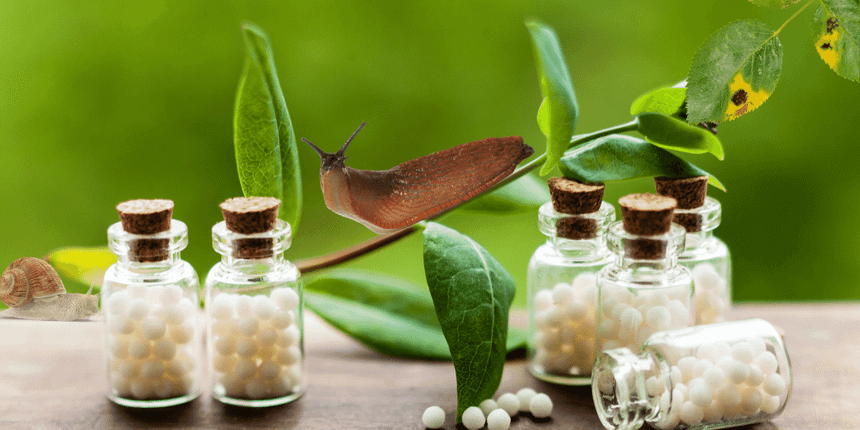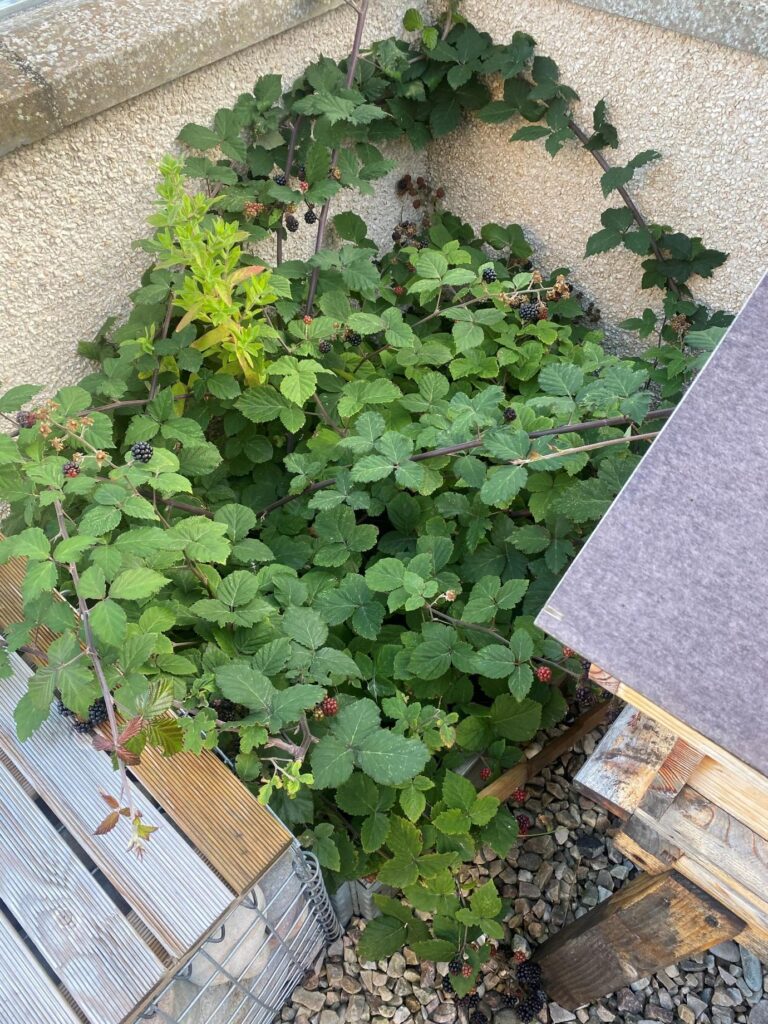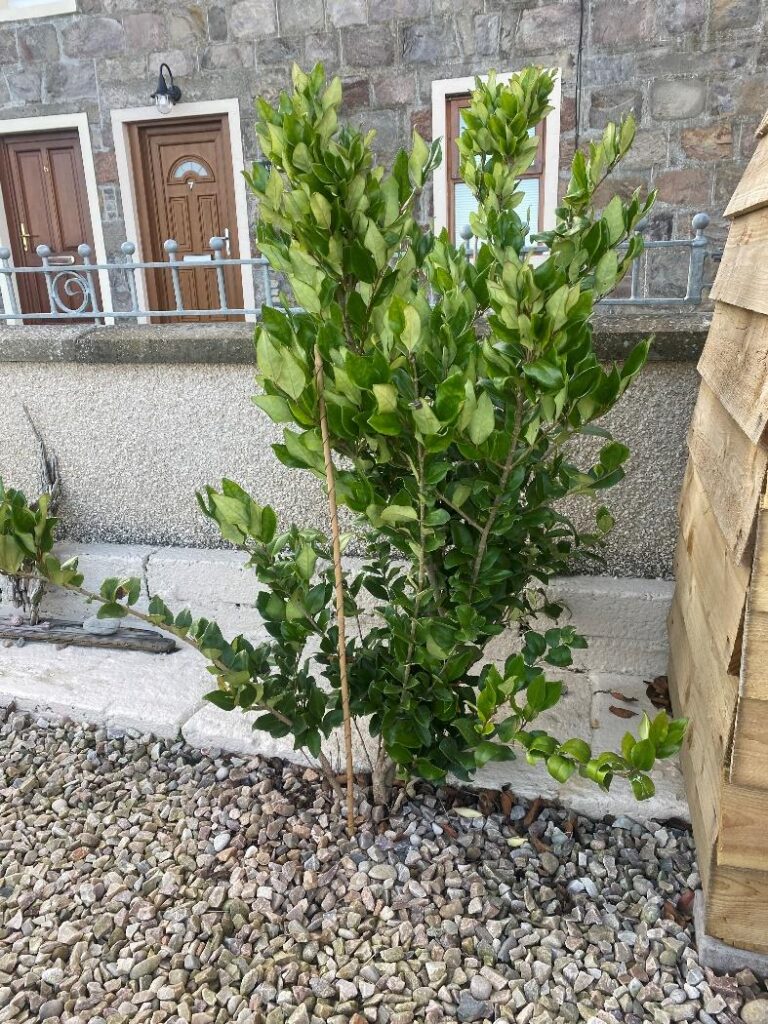Homeopathy & Bach Flower Remedies for Outdoor Plants (and a Brief Introduction to Electroculture)

by Carolyn Foster-Richards Homeopath & Natural Beekeeper
Since qualifying as a Homeopath, over the last 10 years, I have loved experimenting using these amazing remedies on myself, our pets and over more recent years, my bee colonies and our indoor and outdoor plants. As with all my human client cases, I like to make case notes and reflect on my findings, some of which I would like to share with you today. Some of the outcomes on our outdoor plants are particularly interesting as we live in an extreme environment for plants – directly next to the sea in beautiful Northeast Scotland.
Managing outdoor plants by the sea

We moved to Scotland in 2022 to fulfil a lifelong dream of living closer to wildlife and nature. We took on a garden that was completely bare, with literally no plants in it whatsoever, located directly next to the sea. In the first year I enthusiastically planted fruit plants – blueberry, goji, gooseberry, raspberry, strawberries, plus herbs and ornamental grasses. Sadly it became clear after a couple of months that they literally all were failing to thrive, some even looked like they had completely died after their first winter which I felt must have been mainly due to the extreme salty conditions they were living in.
Bringing our plants back to health
Whilst I thought it would be quite a challenge due to the extreme environment where we live, I was determined that with the right remedies, our plants would learn how to thrive using Homeopathy and Bach Flower Remedies. Dr Edward Bach was a doctor and Medical Homeopath before developing his Flower Remedies.
As a Homeopathic practitioner, I am always looking for the potential cause or trigger of an episode of ill health rather than just prescribing on the presenting symptoms. So rather than focusing when working with plants on leaf discolouration, pests etc, I am always looking for the cause. Here is an outline of my plant prescribing based on this concept, using my favourite reference book for the treatment of plants Homeopathy for Plants by Christiane Maute:
Extract from page 91 – Sea air, too much salt in the air and soil
The salt content in the soil means that plants growing closer to the sea tend to be smaller and more vulnerable to disease as well as yielding smaller harvests. The salt impairs the absorption of nutrients in the plants’ capillaries.
Signs of damage: stunted growth, plants wilt and die
Remedy options: Magnesium muriaticum 30C, Natrum muriaticum 30C, Phosphorus 200C, Solidago.
I chose Natrum muriaticum 30C for all of my plants as traditionally in Homeopathy this is a remedy where there is an issue with salt in humans, plus it is worse from too much heat or sun, salty air/soil and also de-icing salt used on roads in winter. Our garden is also next to a road.
Bach Flower Remedies– Rescue Remedy for shock of being moved, Walnut for the change in environment.
April 23 – I administered Natrum muriaticum 30C 1 pill plus 2 drops of each of the flower remedies in a watering can and applied a small amount to all the plants – one dose only, then I watched and waited.
May 23 – there were improvements in the plants, so I gave all the plants some Miracle-Gro Performance Organics All-Purpose Liquid Concentrate Food to provide some additional nourishment.
June 23 – some plants in pots suffered after too much sun plus lack of water since I was away for a period of time. Again a key symptom of Natrum muriaticum, so I repeated the Natrum muriaticum treatment (as April 23) again.
July 23 – 90% of the whole garden plants had regrown and were now in super health! We had a small crop of blueberries, strawberries and an absolutely amazing crop of blackberries at the end of August. I continue to feed the plants regularly as directed with Miracle-Gro.

New planting this year
This year to gain some privacy on one side of the garden, we planted a row of privets. These plants were in really good condition when we bought them but once planted out, like the other plants they failed to thrive. So potential treatment options were:
- Blackish/brown leaf discolouration – Carbo veg 30C
- Failure to thrive in general – Silicea 200C or Psorinum 200C
- Plant in good condition on buying but doesn’t thrive – Kali phos 30C
- Shock – recent frost after period of warm weather – Aconite 30C
- Tonic, toxins, cold frost – Silicea 200C
Thinking back again to the potential cause of ill health, the maintaining cause in our garden is always going to be excessive salt (Natrum muriaticum 30C), but what seemed to initially trigger these particular plants’ poor health was a severe, out of the blue frost after a period of warm weather soon after planting; so in the end I prescribed as follows:
Bach Flower Remedies– Rescue Remedy this time for shock of the frost, Walnut for the change in environment
16th May 23 – Aconite 30C additional support for the shock of the frost – 1 pill plus 2 drops of each of the flower remedies in a watering can and applied a small amount to the privets – 1 dose only, this time I only waited for 3 days as I knew that Aconite had a short action.
19th May 23 – Natrum muriaticum 30C for the ongoing issue with excessive salt in the local environment – 1 pill in 1 watering can and applied a small amount to all the plants – 1 dose only, then I watched and waited.
June 23 – doing much better! Again fed with Miracle-Gro Performance Organics All-Purpose Liquid Concentrate Food to provide some additional nourishment.
23rd July 23 – lots of new growth – yay!!! More Miracle-Gro.
Experimenting with electroculture to build long term strength and resilience
Now I had successfully nursed our plants back to health, my aim was now to build strength and resilience. I had been reading online a lot about electroculture. Here’s a bit more information…
Electroculture gardening is a cutting-edge and fascinating method of plant cultivation that makes use of electrical currents to promote plant development and boost output. While being relatively new and little recognised, this method has recently become more well-liked among gardeners and academics. The idea behind electroculture gardening is that electrical currents and fields can be beneficial to plants. Electrical stimuli have an impact on plants in a variety of ways because they are sensitive to them. For instance, research has demonstrated that electrical currents can promote plant growth, raise seed germination rates, and improve nutrient uptake effectiveness. These principles are used in electroculture gardening to establish the best conditions for plant development.
One of the main advantages of electroculture gardening is that it can increase plant yields and improve the quality of crops. Electrical currents can stimulate plant growth and development, leading to larger and more robust plants. This can result in higher yields of fruits, vegetables, and other crops. Additionally, electroculture gardening can improve the nutritional value of crops by enhancing the uptake of nutrients and minerals from the soil.
Another benefit of electroculture gardening is that it can reduce the need for fertilisers and other chemicals. By improving nutrient uptake and enhancing plant growth, electroculture gardening can help to reduce the amount of fertiliser and other chemicals that are needed to support healthy plant growth. This can make gardening more environmentally friendly and sustainable.
Source: https://altifarm.com/blogs/home-page/electroculture-gardening
July 23 – I started using electroculture. I used bamboo canes and twisted copper wire (taken from old internal wiring) around the canes as described here: https://cultivateelevate.com/blog/electroculture-gardening-techniques-for-beginners-elevate-your-garden

Sept 23 – update I have definitely observed some more growth on all of the plants, more especially noticed on the privets and the blackberry bush. I plan to continue experimenting with this new system and am happy to report my findings in due course.

To find out more and contact Carolyn:
Website: https://bewellacademy.co.uk
Empowering people to reprogramme their health & optimise their wellbeing by reconnecting with nature, nature’s medicines and the body’s innate healing systems; nourishing the mind, body & soul in order to thrive and heal.
Email: hello@bewellacademy.co.uk Tel: 07741 245781

About the author: As well as being a Homeopath and Lifestyle Coach, Carolyn works with businesses helping them to introduce nature based therapeutic environments to their outdoor spaces; encouraging people to connect with nature to support their mental and emotional wellbeing during the working day. Carolyn is also a natural beekeeper using Homeopathy, flower essences and essential oils in the management of bees.
